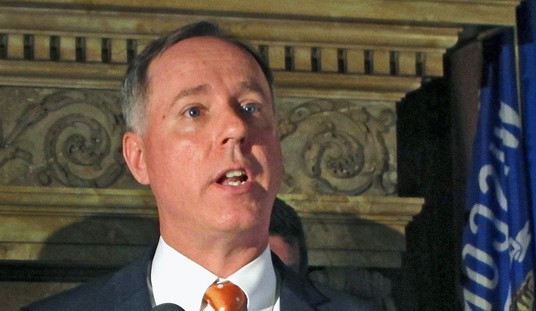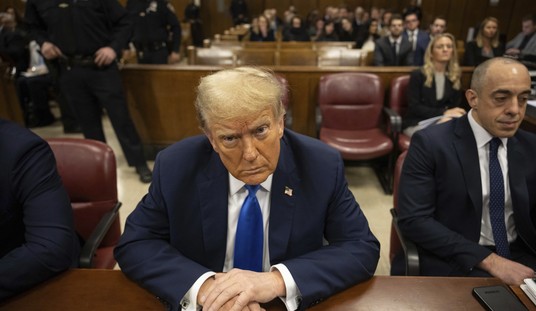Getting the president sent to death row is one way to win a longshot primary challenge, I suppose.
Weld spent most of the 1980s working for the Justice Department but I can’t imagine what he’s thinking here. He doesn’t seem to be speaking hyperbolically; that is, he really does believe that Trump committed treason somehow if in fact he leaned on Ukraine’s president to reopen an investigation into Hunter Biden. Treason is defined as levying war against the United States or adhering to its enemies by giving them aid and comfort. That is … not what Trump’s accused of in the Ukraine matter. Weld seems to be making a rhetorical point, that by inviting Ukraine to meddle indirectly in the coming election by supplying new Biden dirt, Trump is corrupting the integrity of the process and thus betraying the country. But again, that’s not how “treason” is conceptualized in American law. What the president is accused of isn’t war, and there’s no enemy to which he’s adhering.
What crime is he allegedly guilty of, though? One of the defenses circulating among righties this weekend of Trump’s interaction with Zelensky is that Congress can’t impeach him for high crimes and misdemeanors if they can’t point to an actual crime that was committed. Which is untrue — impeachment is a political act, and the Supreme Court isn’t going to “overrule” it by dismissing the charges because the House of Representatives failed to state a claim. Senate Republicans could use it as a reason to avoid convicting Trump, though: “There’s no actual crime in extorting a foreign leader by withholding military aid unless he helps you get reelected! It’s just really, really contemptible.” Is that true, though?
At Slate, Richard Hasen argues that Trump may have committed a campaign-finance crime by soliciting a “thing of value” from a foreign national when he asked for Biden to investigation. The problem, Hasen allows, is that Mueller looked at that issue too when he investigated Don Jr’s famous meeting with the Russian lawyer over dirt on Hillary and declined to indict him for it. There’s precedent now, in other words, that asking a foreign government for oppo on a political opponent isn’t necessarily a crime — although Trump critics would argue that what Trump allegedly did with Zelensky and what Don Jr did with the Russian are materially different. Junior simply inquired as to whether there was already existing dirt on Clinton in Russia’s possession. By leaning on Zelensky, Trump was allegedly requesting that Ukraine *manufacture* dirt on Biden.
At the Daily Beast, former U.S. Attorney Barbara McQuade claims Trump may be guilty of extortion and bribery. Certainly, those are stronger grounds politically for House Democrats in an impeachment proceeding than campaign-finance violations would be. Campaign-finance law is esoteric and most Americans assume all politicians are guilty of breaking it to greater or lesser degrees, I suspect. “Bribery and extortion” is clear and hits you in the gut.
The federal bribery statute makes it a crime for a public official to demand anything of value in exchange for performing an official act. A statute known as the Hobbs Act defines extortion as obtaining property from another, with his consent, under color of official right. “Property” is defined to mean anything of value, tangible or intangible. The essence of both crimes is a demand by a public official to obtain something for himself to which he is not entitled in exchange for performing an official act of his office…
Here, if the reporting is correct, Trump may be similarly committing bribery and extortion by using the power of his office to demand a thing of value, dirt on Biden, in exchange for an official act, the provision of $250 million in military aid. This is precisely the kind of old-fashioned corruption scheme that the bribery and extortion statutes were designed to punish.
That’s the best argument Democrats have. It speaks directly to what’s objectionable about what Trump is accused of — abuse of power, using the authority of his office (over military aid) to benefit himself personally (by creating political trouble for an opponent). Senate Republicans will respond with two defenses. One: It cannot be an abuse of power for the president to encourage a foreign government to crack down on corruption, even if the corruption in question coincidentally involves the Democratic frontrunner for president and even though Trump palpably gives not one wet fart about foreign corruption generally. I’d be keen to know how many times since January 2017 he’s raised the issue of domestic corruption with foreign leaders. Has he even once encouraged Putin to rein in Russia’s kleptocracy a little?
Two: If all else fails, Article II of the Constitution gives the president near-plenary power to conduct foreign policy. If he abuses that power by trying to shake down the Ukrainian government to investigate his most probable presidential opponent, well, them’s the breaks. It can’t be a crime if it’s a valid exercise of constitutional authority. Attorney Jack Goldsmith has already made that argument, in fact. But that would leave Senate Republicans stuck with arguing that there’s no problem with corruption in this case so long as the Constitution provides no remedy for it. And Democrats would counter that there *is* a constitutional remedy — impeachment and removal by the people’s representatives when the president abuses the power that the Constitution has given to him. What’s the response then?
In which @BillWeld2020 suggests Trump should get the death penalty for telling Ukraine to probe Biden’s son pic.twitter.com/S3WsxyBaY1
— Tom Elliott (@tomselliott) September 23, 2019








Join the conversation as a VIP Member